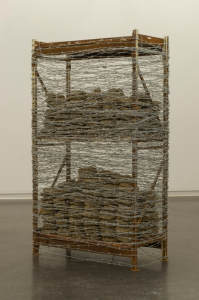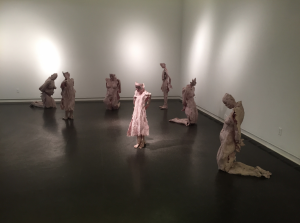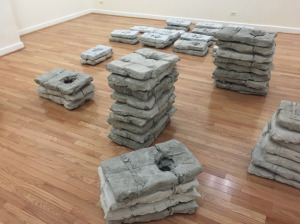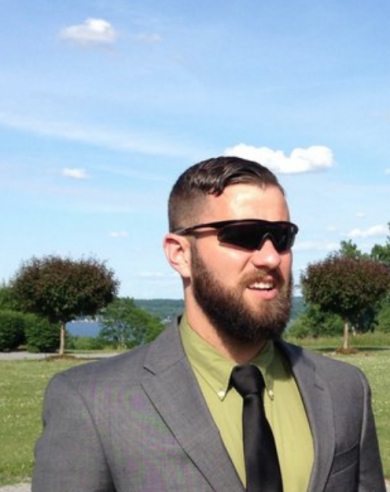Leader Spotlight: Matthew Deibel
9/11 changed everything.
Matthew Deibel remembers shortly after the towers fell, a store owned by one of his Muslim neighbors in Ohio was vandalized.
“I knew them. They were good people, and it was so upsetting—this blanket racism and hatred,” he recalled. The incident would stick with him, and when he joined the Marines in 2005, he made a decision that he wouldn’t allow war to change how he viewed other groups of people.
Deibel enlisted in May of that year, shortly after graduating from Kent University in Ohio with a degree in Art Education. He joined in part out of a sense of altruism and service to country. “I thought we had reason to be in Iraq, and I thought what I was doing there was honorable,” he said. “And seeing the way that civilians existed there—what Saddam had done. It was an atrocity, so I felt some sense of purpose for why we were there.”
But in Iraq, especially during his second deployment, Deibel truly came face-to-face with the harshest realities of war, and what war does to civilians trying to survive in the midst of it. He served in places like Fallujah, Zaidon, and Al-Karmah—kinetic areas with a lot of enemy activity, and where it was very difficult to discern enemy combatants from civilians. The intensity made it easy for many service members to see all Iraqis as ‘others.’
With a desire to walk away from Iraq with a clear conscious, Deibel ensured his actions would not result in civilian deaths. Deibel witnessed other units in engagements that civilians were, in his opinion, needlessly killed. Sometimes it was out of poor cultural communication, illiteracy, or simple fear that civilians found themselves in situations that led to their deaths.
Deibel separated in 2009, but the war stayed with him. He struggled with his own transition and lost several friends to suicide. He continued to think about civilian casualties in Iraq, and how easy it seemed for some here at home to dehumanize other groups of people; it was not unlike what witnessed in his own neighborhood in the weeks following 9/11. He wanted to do something about it.
To process many of those emotions, Deibel turned to his wife—the “rock in my existence”—and, to his art.
Although he initially used his art to process his experiences from Iraq—through what he calls an inward-looking, cathartic exercise—Deibel now sees his it as having a broader purpose.
“I feel that as someone who bore witness to this, I need to respond.” Although he doesn’t believe a person has to have experienced something to understand it or to make art of it, he does feel that his experience demands him to tell the truth about what he saw and to begin a dialogue, with art as the medium.

barbed wire, cow dung

Deibel’s art is wide-ranging in its form. Many artists evolve in a linear fashion, perfecting one technique, but his work continues to evolve through exploration of different mediums and in response to the world around him. He makes use of a variety of materials—paint, pen and masking tape, sculptures formed of mud or cement, the clanging of dog tags—whatever best represents what he’s trying to say. Much of it is post-minimalist/minimalist style, it strips the work down to its purest form to derive its meaning. In one such exhibit, Diaspora, life jackets made of poured concrete and steel sit in silent stacks.

Thematically, Deibel explores his experience and perspective of combat, often focusing on civilian casualties in Iraq, but touching on other urgent humanitarian issues as well, specifically, the global refugee crisis—something he wishes more artists would address in their work.
Deibel recalls feeling so affected by seeing photographs of young Syrian children washing up on European shores. These images, his Christian faith, and his experience in a war zone, have all called him to do something to help. It’s part of why he joined Veterans for American Ideals, so he could help newly arrived refugees through his church and by collecting donations for families in need.
He recognizes that it can be easy for Americans to ignore the crisis, as well as the ongoing war in Afghanistan and continued suffering in Iraq. Living in relative comfort, thousands of miles away, many simply turn off the TV and forget. But he wants to push back against that.
“To me, it’s very important,” he says, “and my art is about things I find important…I try to make art that is accessible and sparks a dialogue.”
Although his work is for anyone and everyone, he especially wants veterans to get off the sidelines, and actively engages with fellow veterans on the importance of standing up for refugees.
“It is our duty. To some veterans I say, remember why we joined. Not everyone joined out of a desire to help people though. But what I can say to anyone who served, regardless of why, is think about your family. When you were off fighting in a war zone, think about your family being there. You’d want the best for them, and the opportunity for them to not be in that environment…We’ve been there, we’ve seen it. It is unreal that people exist in these conditions. Try to imagine your family. Could you turn away your family?”
Matthew Deibel is a U.S. Marine veteran who served from 2005-2009, including two deployments to Iraq. He has worked professionally as an art teacher and is active in the veteran community. You can see and learn more about his art at http://www.matthewdeibel.com/.


